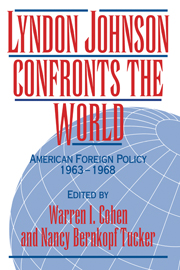Book contents
- Frontmatter
- Contents
- Dedication
- Acknowledgments
- List of Contributors
- Introduction
- 1 Lyndon B. Johnson: Change and Continuity
- 2 Johnson, Vietnam, and Tocqueville
- 3 “A Time in the Tide of Men's Affairs”: Lyndon Johnson and Vietnam
- 4 Threats, Opportunities, and Frustrations in East Asia
- 5 Toward Disillusionment and Disengagement in South Asia
- 6 Lyndon B. Johnson, Germany, and “the End of the Cold War”
- 7 The Promise of Progress: U.S. Relations with Latin America During the Administration of Lyndon B. Johnson
- 8 Keeping Africa off the Agenda
- 9 Balancing American Interests in the Middle East: Lyndon Baines Johnson vs. Gamal Abdul Nasser
- 10 Lyndon Johnson: A Final Reckoning
- Suggestions for Further Reading
- Index
7 - The Promise of Progress: U.S. Relations with Latin America During the Administration of Lyndon B. Johnson
Published online by Cambridge University Press: 05 June 2012
- Frontmatter
- Contents
- Dedication
- Acknowledgments
- List of Contributors
- Introduction
- 1 Lyndon B. Johnson: Change and Continuity
- 2 Johnson, Vietnam, and Tocqueville
- 3 “A Time in the Tide of Men's Affairs”: Lyndon Johnson and Vietnam
- 4 Threats, Opportunities, and Frustrations in East Asia
- 5 Toward Disillusionment and Disengagement in South Asia
- 6 Lyndon B. Johnson, Germany, and “the End of the Cold War”
- 7 The Promise of Progress: U.S. Relations with Latin America During the Administration of Lyndon B. Johnson
- 8 Keeping Africa off the Agenda
- 9 Balancing American Interests in the Middle East: Lyndon Baines Johnson vs. Gamal Abdul Nasser
- 10 Lyndon Johnson: A Final Reckoning
- Suggestions for Further Reading
- Index
Summary
Perhaps in no region of the world was the death of John F. Kennedy felt more profoundly and more widely than in Latin America. The young, dashing president with the beautiful wife – the beautiful wife who spoke Spanish on behalf of her husband during their visits to countries in the region – had captured the imagination and the heart of people rich and poor, old and young, from Mexico to the Southern Cone. But it was not his youth alone that made Kennedy so attractive to Latin Americans. His style was appealing: how he carried himself, and what he said and how he said it. No president since Franklin D. Roosevelt had used language with such care and to such effect. His rhetorical flourishes, which seemed elaborate and even exaggerated to some Americans, only added to his image in Latin America as a leader.
While his call for sacrifice in his inaugural address and his challenge three months later to all in the hemisphere to join in an Alliance for Progress were greeted with enthusiasm in some quarters in the United States, they generated enormous, widespread anticipation in Latin America because of their timing. Many countries were in the process of shifting from authoritarian to civilian, democratic regimes. One observer referred to the period as “the twilight of the tyrants.” There even was a sense of community among the democratic governments, and a sense that they should stick together to defend themselves and to collaborate to bring down some of the remaining “tyrants.”
- Type
- Chapter
- Information
- Lyndon Johnson Confronts the WorldAmerican Foreign Policy 1963–1968, pp. 211 - 244Publisher: Cambridge University PressPrint publication year: 1995
- 1
- Cited by

